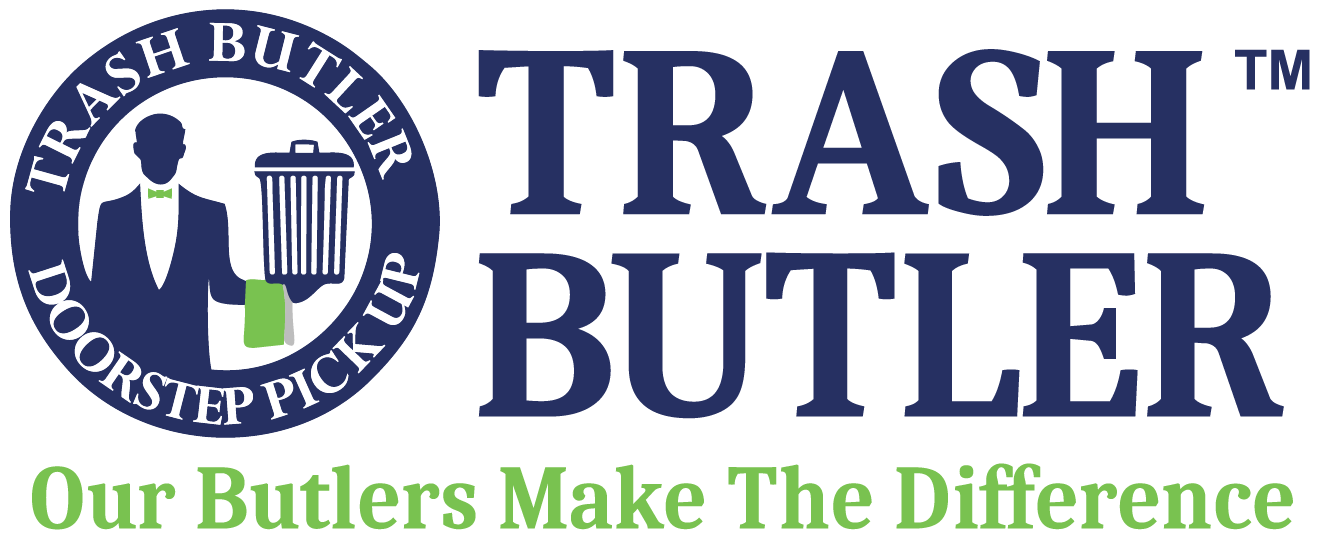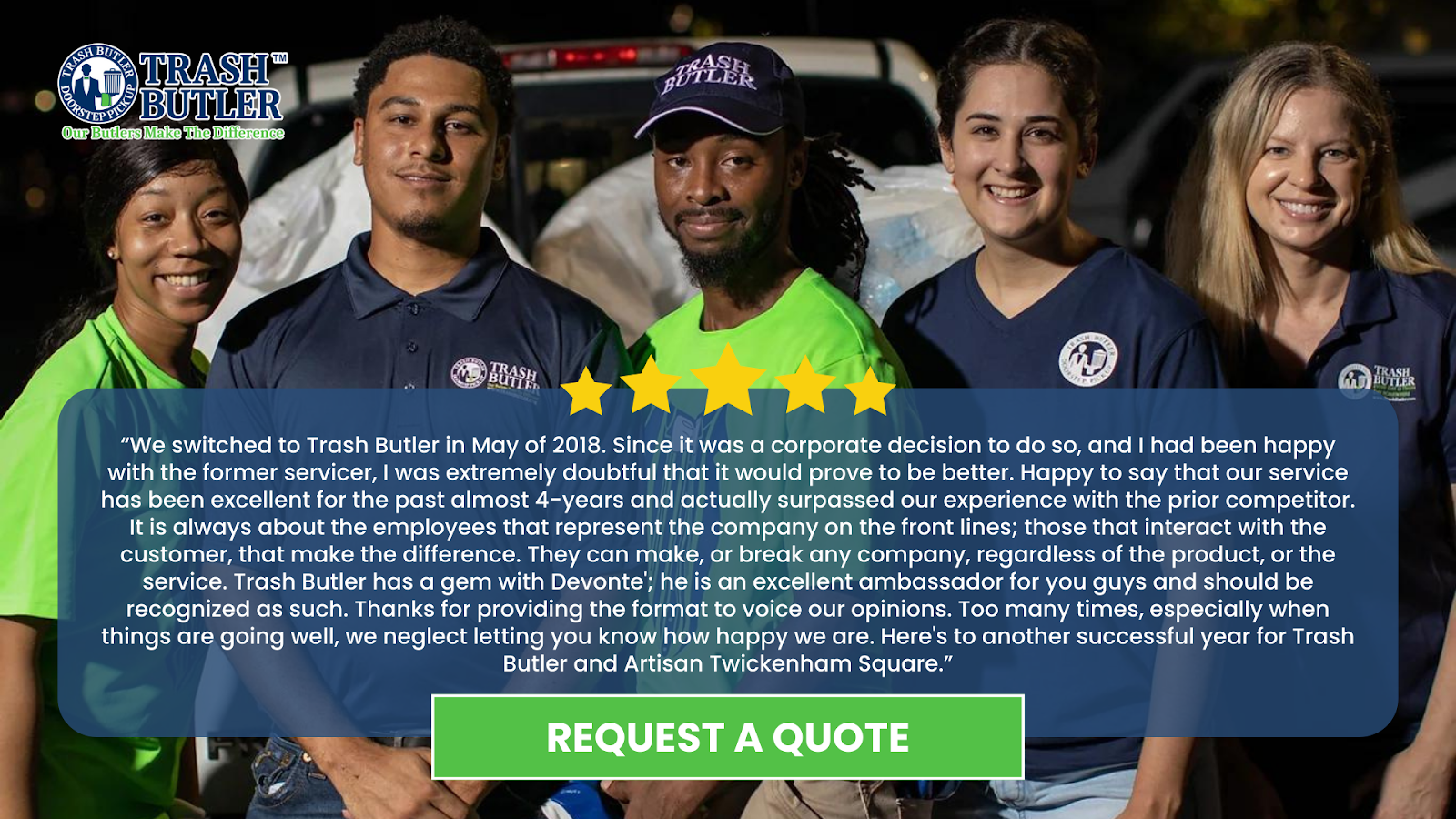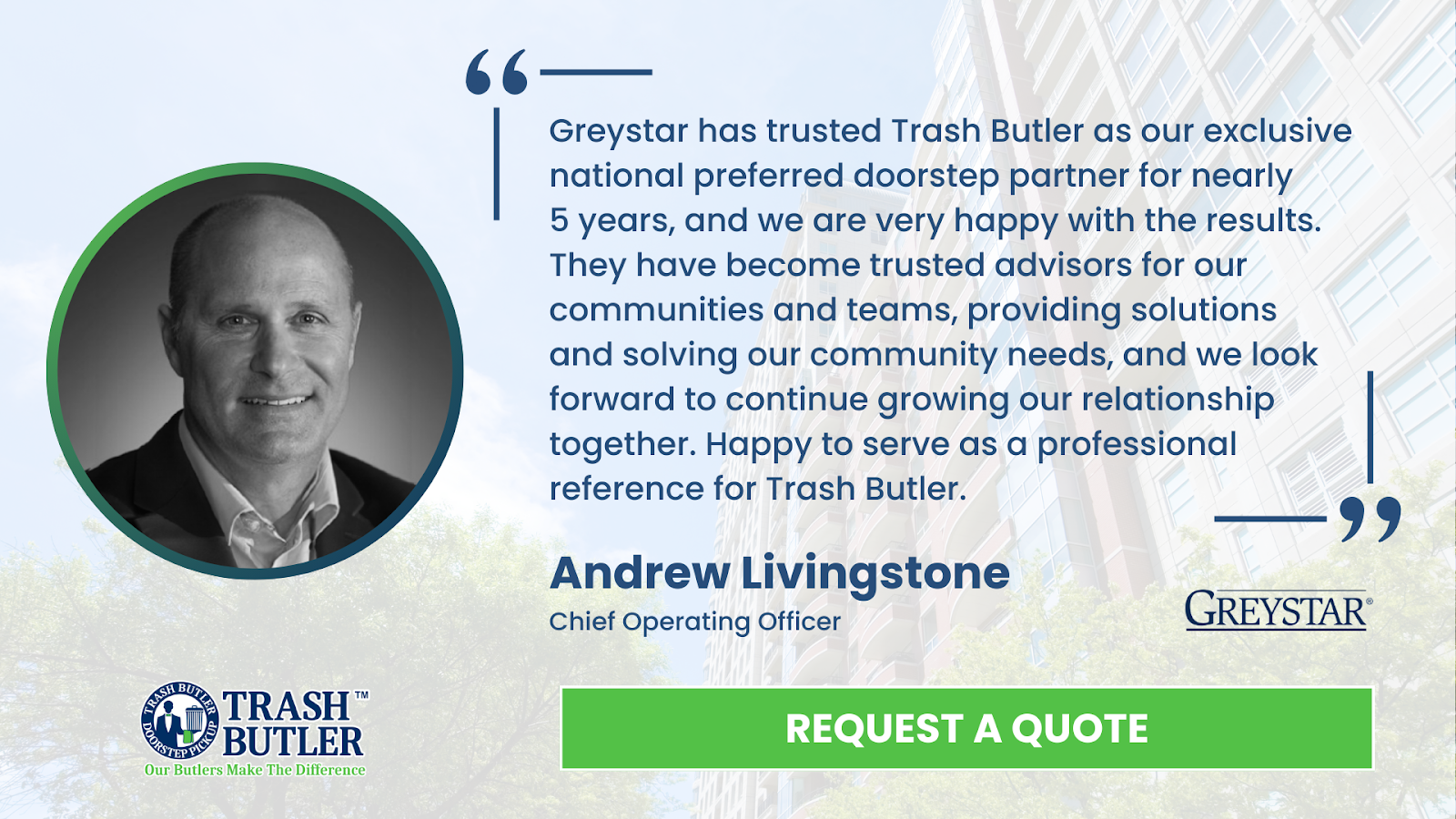Key Takeaways:
- Health and Safety: Clear dumpster rules prevent health hazards from improper waste disposal, promoting a safe living environment for residents.
- Sustainability: Effective waste management practices, including recycling guidelines, significantly reduce the environmental footprint of apartment complexes.
- Community Engagement: Involving residents in the development of dumpster rules fosters a sense of ownership and compliance, enhancing overall satisfaction within the community.
Have you ever noticed how a cluttered dumpster area can transform from a practical waste disposal solution into an unsightly eyesore? Managing dumpster usage in apartment complexes can be a challenging task. Without clear guidelines, residents may unintentionally contribute to chaos, leading to overflowing bins, littering, and even pest infestations. Establishing clear dumpster rules is essential for maintaining a clean and organized environment.
In this article, we’ll show you how to create robust dumpster guidelines that leave no room for confusion. We’ll cover strategies for communicating these rules to residents, ensuring compliance, and transforming your dumpster area from a source of stress into a model of cleanliness. Let’s start making your apartment complex a better place to live!
Why Clear Dumpster Rules Are Essential For Apartment Complexes
One critical aspect of this maintenance is the effective management of waste disposal. Establishing clear apartment dumpster rules becomes essential and a foundation upon which the sustainability and cleanliness of the community is built. Here are some reasons why clear dumpster rules are indispensable for apartment complexes:
Ensures Health and Safety
First and foremost, clear dumpster rules help maintain the health and safety of the residents. Unregulated waste disposal can lead to the accumulation of garbage, which becomes a breeding ground for pests and bacteria. This can pose significant health risks to residents and can deteriorate the overall living conditions within the community. By establishing and enforcing proper waste disposal guidelines, apartment complexes can mitigate these risks, ensuring a cleaner and healthier environment for their residents.
Promotes Sustainability
Clear dumpster rules often include guidelines for recycling and proper disposal of hazardous materials, encouraging residents to contribute to sustainability efforts. By sorting waste and disposing of it according to established rules, apartment complexes can significantly reduce their environmental footprint, promoting a culture of sustainability among residents.
Enhances Aesthetic Appeal and Resident Satisfaction
A clean and well-maintained waste disposal area contributes to an apartment complex’s overall aesthetic appeal. Overflowing dumpsters and scattered trash can detract from the beauty of the community and can be a source of dissatisfaction among residents. Clear, enforced dumpster rules help keep the disposal areas tidy, enhancing the complex’s appeal and, by extension, the satisfaction and morale of its residents.
Prevents Legal Issues
Proper waste management is a matter of community standards and compliance with local and state regulations. Failure to adhere to these regulations can result in fines and legal issues for the property management. Clear dumpster rules that align with regulatory standards help apartment complexes avoid such penalties and maintain good standing within their communities.
Streamlines Waste Management
For property managers, having a set of clear, concise dumpster rules streamlines the waste management process. It reduces confusion among residents about what can and cannot be disposed of in the dumpsters, what the pickup schedules are, and how waste should be prepared for disposal. This efficiency aids Trash Butler™ in providing its revolutionary doorstep valet trash service and recycling solutions, ensuring the seamless waste management operation within the community.
Top Waste Management Challenges In Residential Areas (And How To Solve Them)
Given the density of residents and the shared resources, establishing and enforcing apartment dumpster rules becomes pivotal. Below, we highlight some of the top waste management issues residential areas face and outline strategic approaches to address them.
Inadequate Recycling Practices
- Challenge: Many residents either are unaware of recycling protocols or choose to ignore them, leading to recyclables ending up in the landfill-bound waste stream.
- Solution: Implementing a comprehensive recycling program with clear guidelines is crucial. Educating residents on what can and cannot be recycled, coupled with convenient recycling stations, can significantly improve recycling rates. Trash Butler’s valet trash service integrates seamlessly with recycling efforts, promoting sustainability within apartment communities.
Overflowing Dumpsters
- Challenge: Overflowing dumpsters are an eyesore and a health hazard, attracting pests and contributing to pollution.
- Solution: Regularly scheduled waste collection tailored to the community’s needs can prevent dumpsters from overflowing. Additionally, Trash Butler™ can manage the process, ensuring dumpsters are monitored, and waste is managed proficiently.
Improper Waste Disposal
- Challenge: Disposal of large items, hazardous waste, or special materials often requires adherence to specific protocols, which residents frequently ignore or misunderstand.
- Solution: Clear, visible signage and regular communication about properly disposing of special waste can mitigate this issue. Hosting periodic waste collection events for electronics, hazardous materials, or large items can also encourage proper disposal practices.
Non-Compliance with Dumpster Rules
- Challenge: Despite established rules, non-compliance remains a significant issue, with some residents failing to adhere to basic guidelines like bagging trash or breaking down boxes.
- Solution: Implementing a system of accountability, such as fines or warnings, can enforce compliance. However, positive reinforcement and rewards for compliant behavior can foster a community responsibility culture.
Limited Space for Dumpsters
- Challenge: In older or densely populated communities, there may be insufficient dumpster space, complicating waste management efforts.
- Solution: Compact waste solutions, such as trash compactors, can maximize available space and reduce the frequency of waste collection needed. For communities serviced by Trash Butler™, the convenience of doorstep collection minimizes the impact of limited dumpster space.
How To Create Effective Dumpster Rules For Apartments
Establishing clear and effective dumpster rules within apartment communities is crucial for maintaining a clean, healthy, and sustainable environment for residents. Trash Butler™, a leader in doorstep valet trash service and recycling solutions, recommends the following strategies for creating and implementing effective dumpster rules for apartments.
Identify Objectives
Begin by identifying the objectives of your dumpster rules. Objectives should focus on promoting cleanliness, ensuring the efficient use of dumpster space, encouraging recycling, and maintaining a pest-free environment. Clear objectives provide a foundation for rule development and help to ensure that the rules meet the needs of the apartment community.
Develop Simple and Clear Rules
Complex rules are difficult to follow and enforce. Develop simple, clear, and concise rules that all residents easily understand. This might include directives such as bagging all trash before disposal, not leaving items outside of dumpsters, and breaking down boxes before recycling. Clear communication is key to ensuring compliance.
Educate Residents
Educating residents about following apartment dumpster rules is essential for ensuring compliance. Use communication channels like emails, newsletters, community meetings, and signage around dumpster areas to share information. Educate residents on why rules are in place, such as the benefits of recycling and the importance of maintaining a clean living environment. Trash Butler™ believes informed residents are likelier to follow rules and contribute to the community’s sustainability efforts.
Provide the Necessary Resources
Provide the necessary resources to make it easy for residents to comply with dumpster rules. These could include easily accessible recycling bins, sufficient dumpster capacity, and clear signage outlining what can and cannot be disposed of in the dumpsters. Resources such as on-site recycling guides or links to local waste management facilities can also encourage proper disposal practices.
Set Up a Reporting System
Implement a system where residents can report issues related to dumpster use, such as overfilling or improper disposal of large items. A reporting system not only helps address problems quickly but also encourages a sense of community responsibility for maintaining the dumpster areas.
Regularly Review and Adjust Rules as Necessary
As the apartment community evolves, so should its dumpster rules. Regularly review the effectiveness of your rules and be open to making necessary adjustments. Feedback from residents can be invaluable in this process, helping to refine rules for better compliance and overall community satisfaction.
Communicating Dumpster Rules To Residents
Establishing clear apartment dumpster rules is critical to maintaining cleanliness and promoting sustainability within multi-family apartment communities. However, devising these rules is only half the battle; effectively communicating them to residents is equally vital. Here’s how property managers can ensure that the apartment dumpster rules are conveyed and adhered to:
Utilize Multiple Communication Channels
To reach the broadest audience possible, it’s essential to disseminate the dumpster rules through various platforms. This can include email blasts, community newsletters, social media posts, and flyers posted in common areas or delivered directly to each apartment. Leveraging multiple channels increases the likelihood that all residents receive and understand the new regulations.
Host a Launch Event
Consider organizing an event to kick off the new waste management program. This can be an excellent opportunity to introduce residents to the benefits of following the apartment dumpster rules and how it aligns with sustainability goals.
Provide Clear and Concise Information
Clarity is key when communicating the dumpster rules. Information should be presented straightforwardly and concisely, avoiding technical jargon that might confuse residents. Bullet points or infographics can be particularly effective in breaking down the rules into digestible, easy-to-follow guidelines.
Offer Incentives for Compliance
Encouraging residents to follow the apartment dumpster rules sometimes requires more than clear communication. Offering incentives for compliance can be a powerful motivator. Whether recognition in the community newsletter or small rewards for consistent adherence, incentives can foster a cooperative and motivated resident community.
Implement Regular Reminders
It’s natural for residents to forget or overlook the guidelines as time passes. Property managers should schedule regular reminders via the community’s preferred communication channels to ensure ongoing compliance. These reminders can include tips for reducing waste and recycling properly and updates on how well the community complies with the dumpster rules.
Open Channels for Feedback
Finally, creating avenues for residents to ask questions or voice concerns about the dumpster rules is crucial for ensuring compliance. Whether through a designated email address, community meetings, or direct communication with the property management team, open lines of communication will help address any uncertainties or suggestions for improvement. This approach promotes compliance and fosters a sense of community and collective responsibility towards sustainability.
Enforcing Dumpster Rules Consistently
Compliance with apartment dumpster rules requires a consistent and structured approach to enforcement. By putting in place a clear set of guidelines and expectations from the start, resident adherence can be significantly improved.
Establishing Clear Communication
The first step in consistently enforcing dumpster rules is to ensure that all residents are aware of what is expected of them. This can be achieved through various communication channels, such as welcome packets for new residents, email reminders, and visible signage near dumpster areas. Highlighting the benefits of following these rules, such as maintaining a clean and pest-free environment, can motivate compliance.
Regular Monitoring and Feedback
Consistent enforcement also entails regular monitoring of dumpster areas to identify non-compliance. When infractions occur, timely and constructive feedback to the residents responsible is crucial. Incorporating a system where residents can receive immediate notifications of rule violations can deter future occurrences.
Implementing a Graduated Enforcement Policy
A graduated enforcement policy can effectively manage and correct non-compliant behavior without creating resentment. Starting with a friendly reminder for first-time offenses and escalating to more severe penalties for repeated violations can ensure rules are taken seriously while also being fair.
Empowering Residents
Empowering residents to maintain their living environment can also encourage compliance. Establishing a community committee or appointing responsible residents to oversee the maintenance of dumpster areas can foster a sense of ownership and responsibility. Regular community meetings or forums to discuss waste management practices can also be beneficial.
Addressing Common Violations And Challenges
When managing apartment dumpster rules, property managers and sustainability experts like Trash Butler™ face many challenges and violations that can disrupt community harmony and cleanliness. Addressing these issues proactively is key to maintaining the aesthetic and sanitary conditions of the premises and ensuring a sustainable approach towards waste management.
Identifying Common Violations
Common violations often include:
- Overflowing Dumpsters: When residents don’t compact their trash or use the dumpster outside of scheduled pick-up times, this can lead to overflow issues.
- Improper Sorting: Residents may throw recyclables in the general waste dumpster or dispose of hazardous waste improperly.
- Non-Resident Dumping: A frequent challenge is the use of apartment dumpsters by non-residents, leading to extra waste and potential overflow.
- Bulk Item Disposal: Items such as furniture, electronics, and large boxes can create space issues and are often not allowed in regular dumpsters.
Creating Solutions and Enforcement Strategies
To address these challenges, effective solutions and enforcement strategies are paramount:
- Clear and Concise Communication: Ensure all residents are aware of the dumpster rules through regular communication. This might include welcome package information, email reminders, and visible signage near waste disposal areas.
- Education on Waste Sorting and Recycling: Host informative sessions or provide materials on how to properly sort waste and the importance of recycling. Highlighting the benefits of complying with waste disposal rules can motivate residents to follow suit.
- Implement Surveillance and Monitoring: Consider installing cameras near dumpsters to monitor for non-resident use and other violations. This can deter potential violators and help identify repeat offenders.
- Offer Convenient Waste Disposal Options: Partnering with a service like Trash Butler™ can considerably alleviate common issues. Our doorstep valet trash service ensures that waste is collected efficiently and sustainably, reducing the likelihood of dumpster overflow and improper disposal.
- Establish a Reporting System: Encourage residents to report violations anonymously. This fosters a collective responsibility towards maintaining the cleanliness and sustainability of the community.
- Enforcement of Penalties: While no one prefers to impose fines or penalties, making clear that repeated violations will result in such actions is necessary. Ensure that these penalties are fair, transparent, and stated clearly in all communication about dumpster rules.
Involving Residents In The Rule-Making Process
One of the most effective strategies to ensure adherence to apartment dumpster rules is involving the residents in the rule-making process. This inclusive approach empowers residents and fosters a sense of community and shared responsibility. Here are steps to successfully engage residents in establishing clear dumpster rules:
Conduct Surveys or Meetings
Begin by gathering input from residents about their waste disposal needs and concerns. This can be achieved through surveys, community meetings, or digital platforms. The goal is to understand residents’ habits, preferences, and suggestions. By involving them from the outset, you’re more likely to develop rules that are realistic and favorable to the community’s lifestyle.
Form a Resident Committee
Consider establishing a committee composed of volunteer residents to work directly on drafting the dumpster rules. This committee can serve as a liaison between the property management team and the broader resident population, ensuring that all voices are heard. It also allows for a diverse range of perspectives, making the rules more comprehensive and applicable to all.
Transparent Communication
Transparency is key in building trust and buy-in from residents. Clearly communicate the reasons behind each rule and how it benefits the community, such as promoting cleanliness, safety, and sustainability. By understanding the purpose and advantages of the dumpster rules, residents are more likely to comply.
Feedback Loop
Create a feedback loop where residents can report issues, offer suggestions, and review the effectiveness of the current rules. This can be done through regular meetings, online forms, or suggestion boxes. Feedback should be reviewed and addressed promptly to show that residents’ opinions are valued and considered.
Recognition and Rewards
Acknowledge and reward compliance to boost motivation. This could be in public recognition, small incentives, or privileges for those who consistently follow the rules. Positive reinforcement encourages a culture of compliance and sets a standard for others to follow.
Evaluating And Updating Dumpster Rules
Continuous evaluation and timely updating of these rules are crucial for ensuring compliance, maintaining cleanliness, and promoting recycling habits among residents.
Steps for Evaluating Dumpster Rules
- Feedback Collection: Begin with collecting feedback from residents and property management teams. This can be done through surveys, direct communication, or feedback boxes placed near the dumpster areas. Understanding firsthand experiences and challenges faced by the users can provide valuable insights into what aspects of the dumpster rules may need refinement.
- Assessment of Waste Management Performance: Monitor the volume and type of waste generated, the current usage patterns of the dumpsters, and the recycling rates within the community. This data can help identify any gaps in the existing rules. For instance, if recycling rates are low, it may indicate a need for clearer guidelines or more accessible recycling facilities.
- Review of Sustainability Goals: Evaluate how well the current dumpster rules support environmental goals. Consider factors such as the reduction in waste sent to landfills, improvements in recycling efficiency, and the overall impact on the community’s carbon footprint.
- Compliance Check: Analyze the current level of compliance with the existing rules. Non-compliance could signal that the rules are too complicated, not well communicated, or not properly enforced.
Updating Dumpster Rules
Based on the evaluation, the following steps can ensure the updated apartment dumpster rules are clear, achievable, and aligned with sustainability goals:
- Simplification: Revise and simplify rules to make them easily understandable. Clear, straightforward guidelines are more likely to be followed.
- Communication Strategy: Develop a comprehensive strategy to communicate any changes. This might include community meetings, updated signage near dumpster areas, emails, and reminders in community newsletters. Highlight the benefits of compliance, such as a cleaner living environment and contributions to sustainability efforts.
- Enforcement Plan: Introduce a fair but firm enforcement plan. Define the consequences of non-compliance while ensuring they are consistently applied. The presence of Trash Butler™ personnel can significantly enhance compliance through regular monitoring and direct engagement with residents.
- Education and Incentives: Provide educational resources about waste segregation, recycling, and the environmental impact of proper waste disposal. Consider implementing incentive programs to reward compliance, such as community recognitions or small rewards.
Final Thoughts
Establishing and enforcing clear apartment dumpster rules is essential for maintaining a clean, safe, and environmentally responsible multi-family apartment community. By setting specific guidelines, educating residents, implementing a monitoring system, and applying consistent penalties, property managers can significantly improve compliance rates. However, the task doesn’t end there. Continuous evaluation and adaptation of these rules are necessary to meet the evolving needs of the community and environmental regulations.
With the unique services provided by Trash Butler™, multi-family apartment communities can take their waste management and recycling efforts to the next level. Our innovative doorstep valet trash service and recycling solutions are not just a convenience for residents but a step forward in promoting sustainability. As an industry leader serving over 300,000+ units nationwide, Trash Butler™ understands the importance of effective waste management.
Let us assist you in creating a cleaner, more sustainable community with our expert services, ultimately making compliance a seamless aspect of everyday life for your residents.
Request a Quote: Fill out a form’ to see how Trash Butler™ can benefit your community.
Schedule a Consultation: Contact us to discuss custom solutions for your community’s needs via email: NAbooking@chhj.com
Additional Reading:
- Top Features To Look For When Choosing A Valet Trash Service Provider
- The Ultimate Guide To Valet Trash Service For Multifamily Residences
- Everything Property Managers Need To Know About Doorstep Trash Pickup
Frequently Asked Questions
What should be included in apartment dumpster rules?
Apartment dumpster rules should cover various aspects to ensure effective and efficient waste management. Key elements include the types of waste that can be disposed of, recycling protocols, guidelines for disposing of oversized items, and the schedule for trash pickup. Additionally, the rules should outline the consequences for non-compliance to hold residents accountable.
How can signage help with dumpster compliance?
Signage plays a critical role in promoting dumpster compliance. Clear, visible signs should be placed near dumpsters and recycling bins to remind residents of the dos and don’ts of waste disposal. Signs can include information about what can and cannot be thrown away, recycling instructions, and a reminder about the community’s commitment to sustainability. Effective signage serves as both a guide and a deterrent to non-compliant behavior.
How often should dumpster rules be reviewed?
Dumpster rules should be reviewed continuously, ideally conducted annually or bi-annually. This ensures that the rules remain relevant and adapt to changes within the community or municipality waste management policies. Regular reviews also offer an opportunity to integrate new sustainable practices and address any issues or concerns.
Can residents suggest changes to dumpster rules?
Yes. Encouraging resident feedback on dumpster rules fosters a collaborative community environment. Suggestions can be gathered through surveys, community meetings, or suggestion boxes. By involving residents in the decision-making process, property managers can ensure that the rules meet the community’s needs and are more likely to be followed.
How to dispose of large items not meant for dumpsters?
Provide clear guidance on alternative disposal methods for large items that cannot be disposed of in dumpsters. This may include scheduling bulk pickup days, providing contact information for local waste management services that accept large items, or organizing community recycling events. Informing residents about these alternatives helps prevent illegal dumping and keeps the community clean.
Are cameras or monitoring effective for compliance?
Cameras and monitoring can be effective tools in ensuring compliance with dumpster rules. They can deter residents from violating policies and provide evidence if issues arise. However, it’s crucial to balance security measures with respect for residents’ privacy. Notification about surveillance and its purpose in promoting a clean and sustainable living environment can help mitigate privacy concerns.







